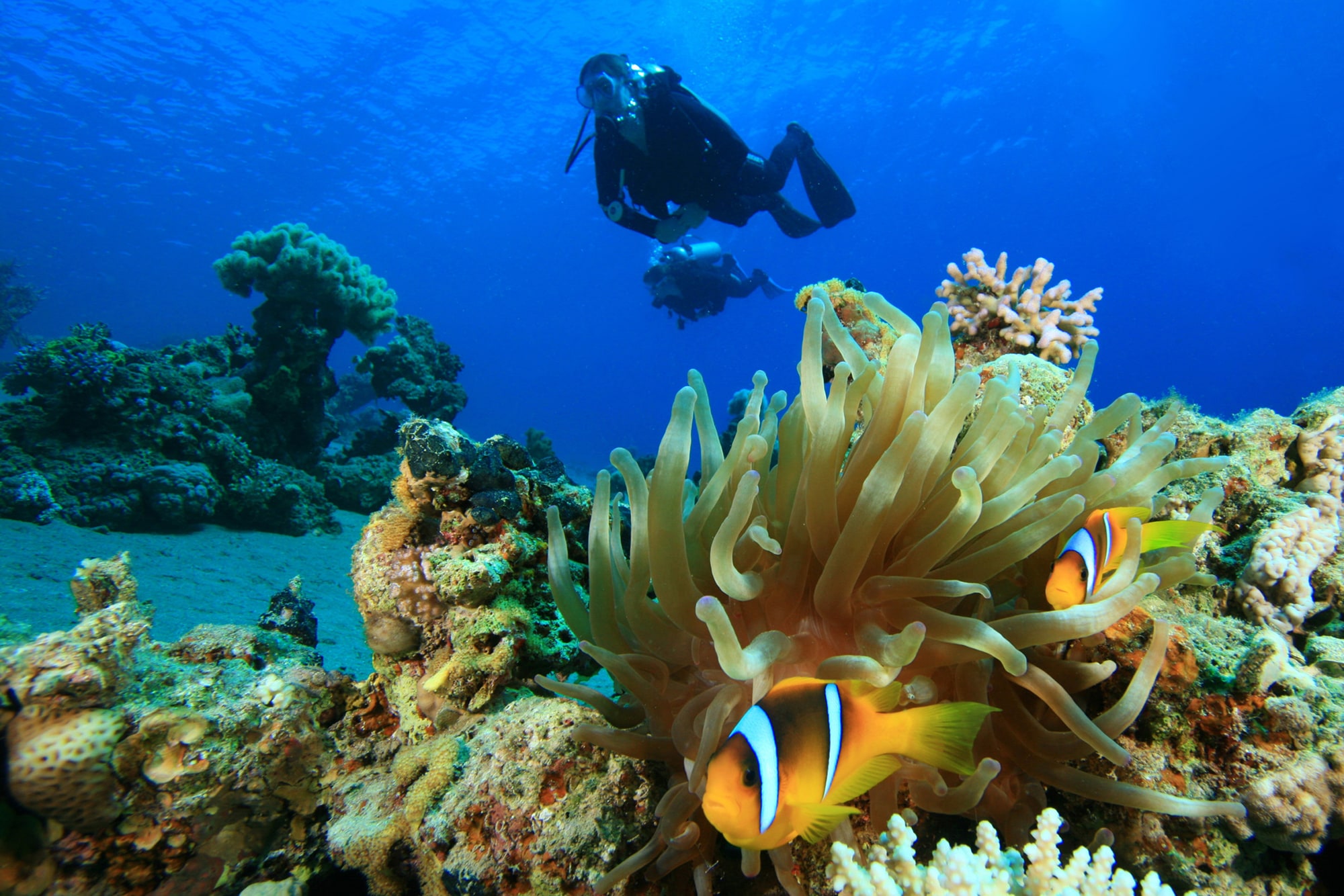Dangerous Species and Others Even More So
Yes, that’s right: the most aggressive fish of all is the clownfish. You’ve got it, Nemo himself. That little orange fish who looks so sweet will be sure to attack you if you get too close to his anemone. He would do the same thing to a 14-metre whale shark. His small size is ridiculous in contrast to the force of his headbutting, but just imagine what would happen if some weird substance like plutonium or say bodybuilding supplements leaked into the sea and some genetically altered Nemos were to grow a couple of metres long. Scary, eh? Those who know clownfish well, like photographers, for example, when faced with mutant Nemos might opt to go and take pictures of insects and flowers instead.
But let’s get back to the real problem. The torment of beginners, which was also that of the first diving pioneers, is closer to reality: it is the fear of the unknown, the creatures and the environment of which no-one has control. Slowly, however, statistics have been gathered: showing us that most shark attacks take place on the water’s surface. Diving seems almost entirely a safe-zone from shark attacks. Once this concept is understood on the limbic level, divers can happily swim with tiger sharks, bull sharks and other bloodthirsty creatures.
But Man is never satisfied. His biggest problem, as said before, is control: once he becomes confident with marine creatures, he begins to treat them like cows, dogs, horses and chickens… Once he has defeated his primeval fear, he starts riding devilfish, turtles and dolphins; he starts feeding sharks, skates, groupers and everything he meets, as if they were horses or hens, turning part of the reef into his personal farmyard.
To further their status as “leader” underwater, i.e. exert their control over fellow divers, many guides and divemasters fondle moray eels, feed dead fish to bull sharks, and open the mouths of stonefish to show the pure white inside. I have seen divers handle lionfish, feeding turtles, damselfish and sting rays. I haven’t seen underwater guides playing with sea snakes or box jellyfish as of yet. But this doesn’t mean it hasn’t happened or isn’t going on right now as I write. I wonder whether any Australian guides have ever tried putting on a show with a nice ‘Salty’, a marine crocodile. I’d be very curious to find out how that went. Obviously, these guides are alpha males (even the female guides are to be considered alpha males). Should there be another alpha in the diving party, emulation will arise. And with emulation, accidents multiply.
Theories on first aid methods have instead always arisen and multiplied on their own, and so has the list of miraculous galley antidotes. Divers’ imagination knows no limits, and then people wonder why it is that so many of them become artists, directors and writers. I know an instructor who was arrested for trying to save the victim of a Portuguese Man Of War, the Physalia physalis. That urine also contains ammonia is sacrosanct, but to discharge it straight from the bladder onto a screaming man is not such an obvious remedy to say the average family on a crowded summer beach. Instead, when a guy named Danny (as we shall call him) managed to get his bottom stung by a scorpion fish, we wondered how he did it, and we made him squat in a bucket full of very hot water, heated to the famous 45° (though he shrieked it was hotter.) Obviously afraid he’d boil something more precious than his pale cheeks, he spent almost an hour quivering in an improbable cramp-inducing position. I’ll spare you the photos.
Then there’s Paula, who every time someone hurts themselves on fire corals, sneers: “We’ve told them a thousand times to stay away from the coral! Nature defends itself!” We are the invaders. Fish, jellyfish and coral don’t invade our space, or dump their toxic rubbish in our homes. When Paula and I meet in Sharm el-Sheikh, we go down to the beach in El Hadaba to talk. In front of us lies the coastal reef platform, and there’s always someone walking on it.
“I’m tired of shouting, I hope some stonefish will just do the business,” says Paula when she’s fed up. Then she sits up, clasps her knees and says, “We should breed some stonefish, you know, and plant a few around. I’ll bet that would stop them!” “That would be another distortion, Paula.” “No, no! We have helped so many rebels defend themselves from bloody dictators, providing them with weapons and yet… we don’t do anything for the sea.”
Paula always strikes me. I don’t know whether she’s right or wrong, but I answer: “We’re already working on the mutant clownfish with the caesium and plutonium…” She looks at me, with her air of alpha male superiority and then lies down again, dreaming of her breeding of fighters for the revolution.
About the author
To find out more about the author, visit his website and check out his blog!

